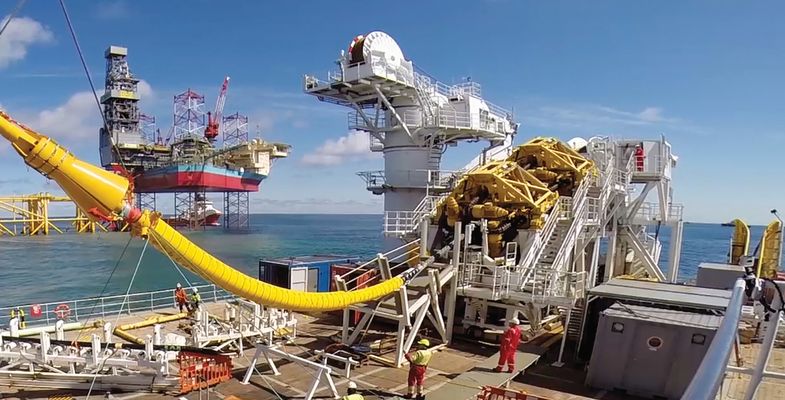EN 50382 Railway and Offshore Power Cable Testing
The EN 50382 standard is a crucial document in the realm of electrical power cables used in both railway systems and offshore platforms. This standard ensures that cables meet stringent safety, performance, and environmental requirements. Compliance with EN 50382 is mandatory for manufacturers looking to ensure their products are suitable for use in these critical sectors.
The testing process outlined by EN 50382 involves a series of rigorous evaluations designed to assess the mechanical strength, electrical resistance, and overall durability of power cables. The tests are particularly important in offshore platforms where environmental factors such as humidity, salt spray, and temperature variations can significantly impact cable performance.
For railway applications, EN 50382 ensures that cables operate reliably under conditions that include frequent starts and stops, vibrations, and exposure to various weather elements. The standard covers a wide range of tests including mechanical strength testing, insulation resistance measurement, voltage withstand testing, and thermal cycling tests.
The tests are not merely theoretical; they involve real-world parameters such as the type and size of the cable, its intended application, and environmental conditions it will face. For instance, in offshore environments, cables must be tested for their ability to withstand corrosion from saltwater, while railway cables need to handle frequent temperature changes and mechanical stress.
The testing process begins with careful preparation of the specimen. This includes selecting the appropriate cable type based on its intended use and ensuring that it is free from defects before testing. Once prepared, the cables undergo a series of tests designed to simulate real-world conditions they will encounter in service.
Key components of EN 50382 testing include:
- Mechanical strength testing to ensure cables can withstand physical stress without breaking
- Insulation resistance measurement to check the integrity of the insulation layer
- Voltage withstand testing to assess the cable's ability to handle high voltage without failure
- Thermal cycling tests to evaluate performance under varying temperatures
The results of these tests are meticulously recorded and reported according to EN 50382 guidelines. This documentation is essential for manufacturers, as it provides evidence that their products meet the stringent requirements set forth by this international standard.
Compliance with EN 50382 not only ensures safety but also enhances operational efficiency in both railway and offshore platforms. By adhering to these standards, companies can reduce maintenance costs and extend the service life of their cables, leading to greater reliability and lower overall costs over time.
In summary, EN 50382 provides a comprehensive framework for testing power cables used in railway systems and offshore platforms. The rigorous tests outlined by this standard ensure that cables are robust, reliable, and safe for use in these critical sectors.
Industry Applications
The EN 50382 Railway and Offshore Power Cable Testing is widely used across various industries where high-quality electrical power distribution is essential. Here are some key applications:
- Railway Infrastructure: Ensuring the reliability of power cables in railway systems to support safe and efficient train operations.
- Offshore Energy Platforms: Providing robust power supply solutions for oil rigs, wind farms, and other offshore structures.
- Solar Farms: Supporting the reliable operation of solar energy installations by ensuring the integrity of power cables.
- Wind Turbines: Guaranteeing that power cables in wind turbine systems can withstand harsh environmental conditions.
- Submarine Cables: Ensuring the robustness and reliability of submarine power transmission lines used to connect remote islands or continental landmasses.
In each of these applications, the EN 50382 standard plays a pivotal role in ensuring that cables perform reliably under diverse environmental conditions. This ensures not only safety but also operational efficiency, which is crucial for the smooth functioning of critical infrastructure.
Why Choose This Test
Selecting EN 50382 Railway and Offshore Power Cable Testing offers several advantages over other testing methods:
- International Recognition: Compliance with this standard is recognized globally, ensuring that your products meet the highest industry standards.
- Comprehensive Evaluation: The tests cover a wide range of scenarios that cables might encounter in real-world applications, providing comprehensive evaluation.
- Enhanced Reliability: By adhering to this standard, you ensure that your power cables are reliable and safe for use in critical sectors like railways and offshore platforms.
- Economic Benefits: Reliable cables reduce maintenance costs and extend the service life of equipment, leading to long-term savings.
- Safety Assurance: Ensuring compliance with EN 50382 minimizes risks associated with power cable failures, enhancing overall safety in railway systems and offshore platforms.
The comprehensive nature of EN 50382 testing ensures that manufacturers can produce high-quality products that are safe, reliable, and compliant with global standards. This is particularly important for companies operating in competitive markets where product quality and reliability are paramount.
Customer Impact and Satisfaction
The rigorous EN 50382 Railway and Offshore Power Cable Testing has a direct impact on customer satisfaction and operational efficiency:
- Increased Safety: By adhering to this standard, manufacturers can ensure that their power cables are safe for use in critical sectors like railways and offshore platforms. This leads to higher customer confidence.
- Better Reliability: The comprehensive testing process ensures that cables perform reliably under various conditions, leading to fewer operational disruptions and increased productivity.
- Economic Benefits: Reliable power cables reduce maintenance costs and extend the service life of equipment, resulting in significant long-term savings for customers.
- Global Recognition: Compliance with this standard is recognized globally, ensuring that your products meet the highest industry standards. This enhances customer trust and satisfaction.
Overall, EN 50382 Railway and Offshore Power Cable Testing provides a robust framework for ensuring product quality and reliability. By adhering to this standard, manufacturers can produce high-quality cables that are safe, reliable, and compliant with global standards. This not only enhances customer satisfaction but also contributes to the overall success of your business.





